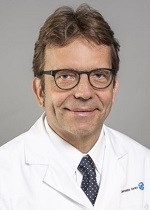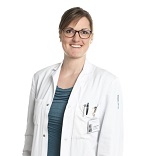Swiss radiation oncology association promotes the next generation and strengthens ties with ESTRO
Members of the young section of ESTRO (yESTRO) spoke to representatives of the Scientific Association of Swiss Radiation Oncology (SASRO) about the aims of the Swiss group
Interview with Professor Oliver Riesterer, SASRO president and head of the Radiation Oncology Center KSA-KSB, Cantonal Hospital Aarau, Switzerland.
The theme of the annual SASRO meeting in 2022 was “promoting the next generation”. Why was this theme chosen?
Prof Riesterer: most radiation oncology (RO) meetings emphasise themes that are related to technology and patients. We chose the theme "promoting the young generation" because we wanted to focus our attention on what we consider to be the most important resource of our speciality: our young colleagues within all professions. Another reason was that current technological developments challenge how we work together, designate our tasks and define the education that will be needed and to what extent. Furthermore, other professions will probably play more prominent roles in RO in the future. Therefore, to begin, we offered talks on medical informatics and a parallel session for study coordinators.
How was the “next generation of young RO professionals” promoted throughout the congress?
Prof Riesterer: a joint multidisciplinary SASRO-ESTRO symposium was dedicated to the future education of all RO professionals. An extra proffered papers session was reserved for colleagues in training, and a young investigator award was presented within this session. Furthermore, we offered a networking café that provided a relaxed space for young professionals and experienced mentors from different hospitals across Switzerland to discuss freely their professional experience and to establish contacts.
Can you tell us more about the idea/choice of a joint ESTRO-SASRO session?
Prof Riesterer: the decision to conduct a joint ESTRO-SASRO session arose from our interest in ESTRO's vision regarding the development of all RO-related professions in the future. Therefore, we invited: the ESTRO president, Anna Kirby, to talk about the future of radiotherapy and what this meant in terms of today's education; the chair of the ESTRO physics committee, Catharine Clark, to talk about ways to ensure optimal preparation of the next generation of medical physicists; and, from the yESTRO committee, Sophie Perryck, who presented the vision and strategy of yESTRO. This session was very well attended and it was one of the highlights of our annual meeting. Immediately after the ESTRO-SASRO session, Mary Coffey (Trinity College Dublin, Ireland) was awarded honorary membership of SASRO for her lifetime commitment to the education of radiation therapists (RTTs). After an explanation of Professor Coffey’s achievements from Jean Bourhis (Lausanne University Hospital, Switzerland), Professor Coffey presented her talk entitled "Professional recognition defining competencies and education requirements: a new era for RTTs".
Any additional thoughts/comments?
Prof Riesterer: The beauty of SASRO is that it is a multi-professional society that includes all disciplines involved in RO. Based on this, the SASRO board is committed to the conduct of multidisciplinary workshops during the year, in which we take up new topics and developments in RO. The aim of these workshops is to promote the education and exchange of young colleagues within all professions. With regard to the promotion of the future of our speciality, specifically with regard to education, I think it would be desirable to increase interaction between national societies and ESTRO. The theme "promoting the next generation", as a platform through which to exchange ideas about current and future education in RO, might be incorporated into future ESTRO annual meetings.

Prof Riesterer
Interview with Dr Elena Riggenbach, SASRO board member and consultant at the Department of Radiation Oncology, University Hospital Bern, Switzerland
You are the young representative and a recent member of the SASRO board - how did this come about?
Dr Riggenbach: the board of our national society has recently extended its membership to ensure the inclusion of young colleagues. The idea came from the former SASRO president, Prof Bourhis, who suggested that a junior representative should be on the board in order to have a better representation of the whole RO community. He contacted me directly while I was working as a resident in his department. I feel honoured to be part of this committee and to be able to offer the perspective of the younger generation during discussions of upcoming events and the near future within our society.
What was your first year like? What is the added value of having a young member on the board?
Dr Riggenbach: Now, as well as representation from the various specialities within RO, we have the different generations represented. The respectful and calm atmosphere of our committee enabled me to transition from observing and learning about the structure and internal organisation to becoming more active during the last few months. Supported by our team, I was able to organise a first national contouring workshop on head and neck cancers, which took place in November 2022. It was especially nice to see a mixed group of all professionals from within our speciality attend the workshop.
I believe the impetus behind promoting young professionals in RO and involving them in conversations and decisions about the future is: (1) that rapid progress is being made in our field and dynamic people adapt best to changing landscapes; and (2) the realisation that young members make up a big proportion of our national community.

Dr Elen Riggenbach